IOS organises Panel Discussion on “Post-Bihar Poll: Where do we go from here?”
November 14, 2015 at 162, Jogabai, Institute Building, Jamia Nagar, New Delhi
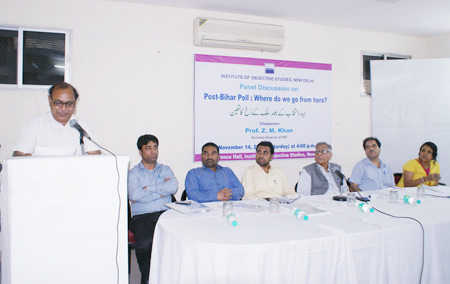
L-R: AU Asif, Senior Journalist; Rizwan Ahsan, Political Activist and Analyst; Qasim Syed, Chief Editor, Urdu daily, Roznama Khabrein; Dr. Aftab Alam, Assistant Professor, Department of Political Science, Zakir Husain College, Delhi University; Prof. ZM Khan, Secretary General, IOS; Iftekhar Geelani, National Bureau Chief, DNA; Bhasha Singh, Bureau Chief, Hindi news magazine, Outlook
A panel discussion on “Post-Bihar Poll: Where do we go from here?” was organised by the Institute of Objective Studies, on November 14, 2015 at the conference hall of the Institute. Initiating the discussion senior journalist, AU Asif, referred to the veteran journalist, Rajdeep Sardesai’s book on Lok Sabha elections-2014 and said that the scenario post-parliamentary polls had changed for the better after the recently-held Bihar assembly elections. He observed that the voters rose above the OBC politics and exercised their right to franchise. Muslims too played a significant role in tilting the balance in favour of the Mahagathbandhan (Grand Alliance) by silently casting their vote. He noted that three-fourths of the candidates fielded by both Nitish Kumar and Lalu Prasad Yadav belonging to their castes registered their victory. Besides, high-caste voters supported the Mahagathbandhan demonstrating political maturity and far-sightedness of Biharis, he pointed out.
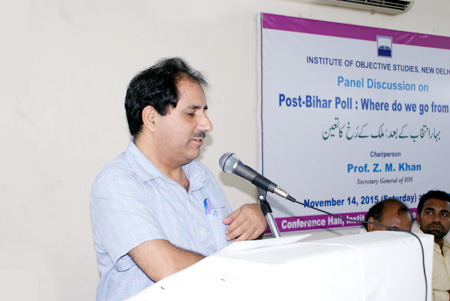
Iftekhar Geelani, National Bureau Chief, DNA, held that the Bihar assembly elections results were eagerly awaited at the international level. He said that the ambassadors of countries like Cameroon and Ghana were evincing keen interest in the outcome of Bihar elections during the Afro-Asian Summit at Delhi which coincided with the last phase of the poll. Three parties forged an alliance to contest elections with the invocation of social engineering that strongly worked in their favour. The grand alliance romped home with spectacular success by bagging nearly three-fourths of total seats in a House of 243. While the alliance partners, viz, the Janta Dal (United), Rashtriya Janta Dal (RJD) and Congress campaigned at the macro-level, the RSS chief Mohan Bhagwat’s statement on reservation to the backward and the scheduled castes and tribes drove the last nail in the coffin of BJP. The grand alliance exploited his statement in its favour by convincing the depressed sections that reservation currently available to them could be in peril if BJP came to power in the state.
He insisted that Lalu Prasad Yadav played an important role in pulling Muslims out of fear psychosis by stating that not only Muslims but also a sizeable section among Hindus consumed beef. He said that the alliance partners deserved credit for checking BJP’s bid to convert the elections into Muslims versus Hindus. In this election, both Scheduled Caste and Muslims united against saffron threat. He held that issues relating to women were never raised in this election. He also opined that the issues raised during the Bihar assembly poll would not necessarily be replicated in the states where the elections were due next year and a year later. Separate strategies would have to be devised for elections in others states, he said.
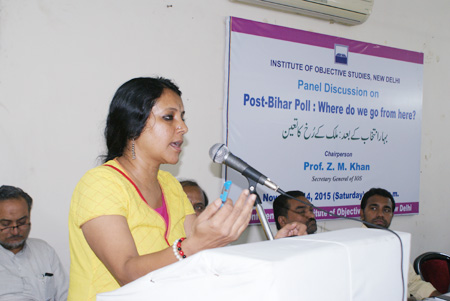
Bureau Chief of the Hindi news magazine, Outlook, Bhasha Singh, held that the Bihar elections signalled a positive message to the rest of the country. She said that the Bihari electorate inspired a sense of confidence among those who championed the cause of secularism, justice and brotherhood in society. Analysing the election results, she noted that RSS and its fringe elements threw their weight behind BJP, but miserably failed. She opined that no perceptible change in vote bank of BJP was evidenced. Similarly, the Mahagathbandhan could not dent the saffron party’s vote bank. Instead, the grand alliance utilised the caste divide in its favour by winning over splintered votes. In this connection, she mentioned RSS chief’s comment that the results could be described as the victory of caste politics.
The results, she said, proved that even in adverse circumstances, impossible could be made possible by employing fool-proof strategy and meticulous planning. She said that Nitish Kumar’s gambit of reservation to women and special attention to girl education paid off rich dividends to the grand alliance. It was owing to his focus on girl education that girls were seen going to school by cycles. Women’s empowerment provided up to panchayat level created a congenial atmosphere and rural women voters irrespective of castes voted Nitish and his Mahagathbandhan. She also said that this was a fight between Kamandal and Mandal-II.
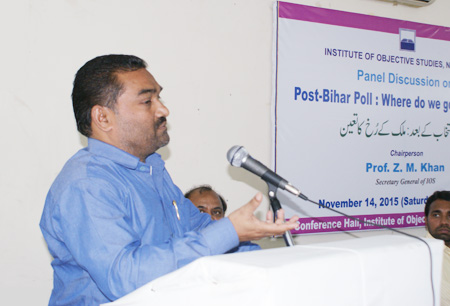
Chief Editor of the Urdu daily, Roznama Khabrein, Qasim Syed argued that the issue of Biharis and non-Biharis was one of the factors that clicked with the voters who viewed Nitish as the “son of the soil”. He insisted that the voters of Bihar were awakened and they would not tolerate anybody to play with their pride. There was also a fight of ego and for survival, and the ultimate winner was the sense of self-respect. He remarked that it was too early to predict if the strategy that was adopted in Bihar elections would be replicated in other states due for poll. But there was no denying the fact that the pact inked by Nitish and Lalu for their political survival handsomely paid them belying the claims of pollsters. He raised the question of Muslims as being used as a mere vote bank wondering as to how long would that continue.
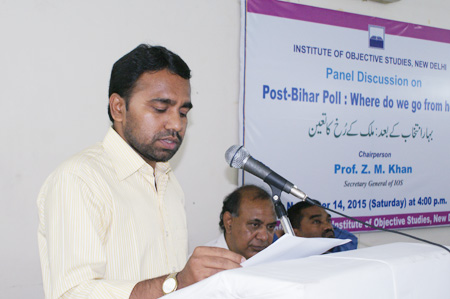
The Chairman of the IOS, Dr. M. Manzoor Alam, who could not make it to the panel discussion, in a message which was read out by Dr. Aftab Alam, Assistant Professor, Department of Political Science, Zakir Husain College, Delhi University, said that Bihar elections might not be a game-changer, but they certainly pointed to the possibilities of a secular front in future. The havoc BJP and its Sangh affiliates had created over the last 18 months was there for all of us to see. What was called “intolerance” was a fact of life, and it was reflected not only in award returns by some of our brightest talents, but also in huge protest rallies against it in London, he noted. He said that in mere 18 months this government had completely alienated neighbours, including the good old faithful Nepal, with whom the PM professed to have good relations. Today these ties were at the lowest ebb in decades. He observed that the economy was not looking up despite cheap oil. Investors in New York and London were hesitant to plough in their money amid such uncertainty. He remarked that the magician was losing charm by the hour, running out of tricks.
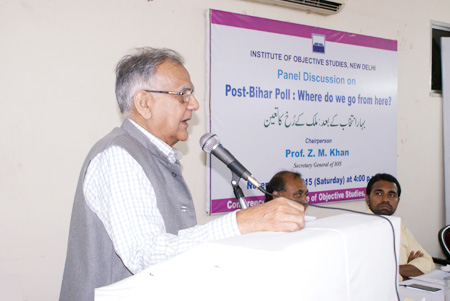
The Secretary General, IOS, Prof. ZM Khan, who presided over the panel discussion, stressed the need for focusing on the problems faced by the marginalised sections. He said that the Bihar elections had proved that alliances could fructify if the partners had a sense of commitment and unity of action. He praised the people of Bihar and Jammu and Kashmir for demonstrating political maturity.
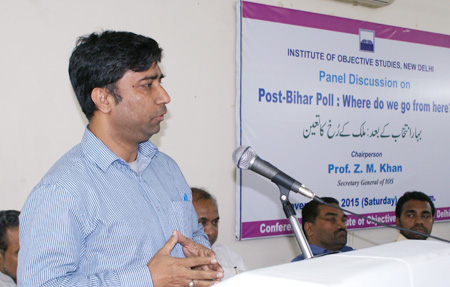
On this occasion, political activist and analyst, Rizwan Ahsan also expressed his views. While the function began with the recitation of a verse from the Holy Quran by Hafiz Athar Husain, the proceedings were conducted by Khalid Husain Nadwi. Those who attended the function included Assistant Registrar, JMI, Mazharul Haq Ansari, Ameenuddin Ahmad, Dr. Bezwadah Yasin, Javed Akhtar from the UNI, Syed Mehdi Husain, advocate, social auditor, Naushad Ahmad Chauhan and Syed Ahmedullah, journalist, besides social activists and prominent citizens.
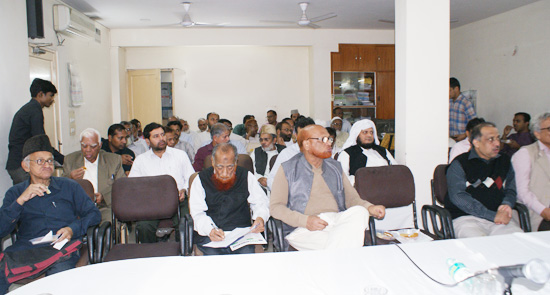
A view of Dignitaries
Go Back